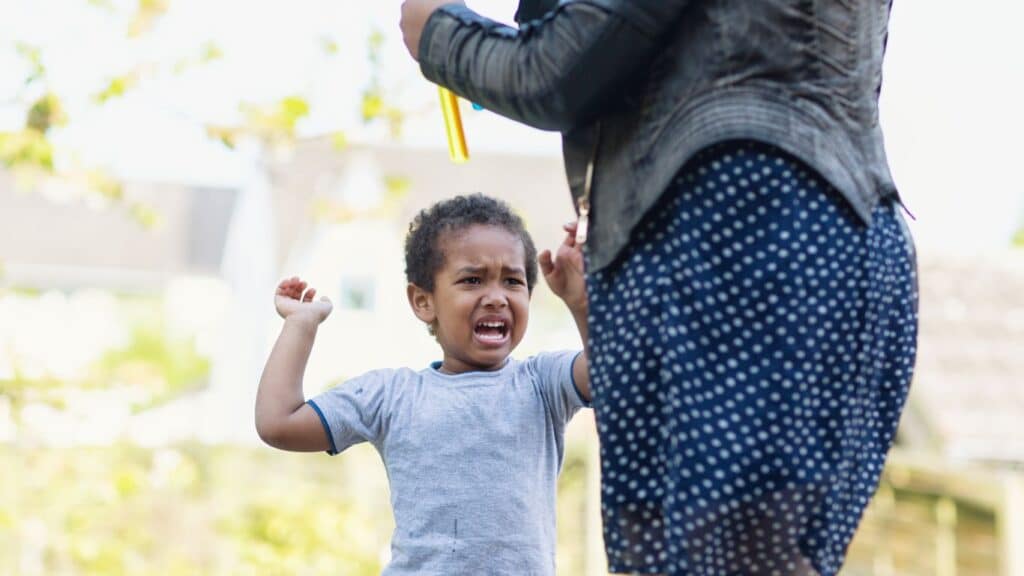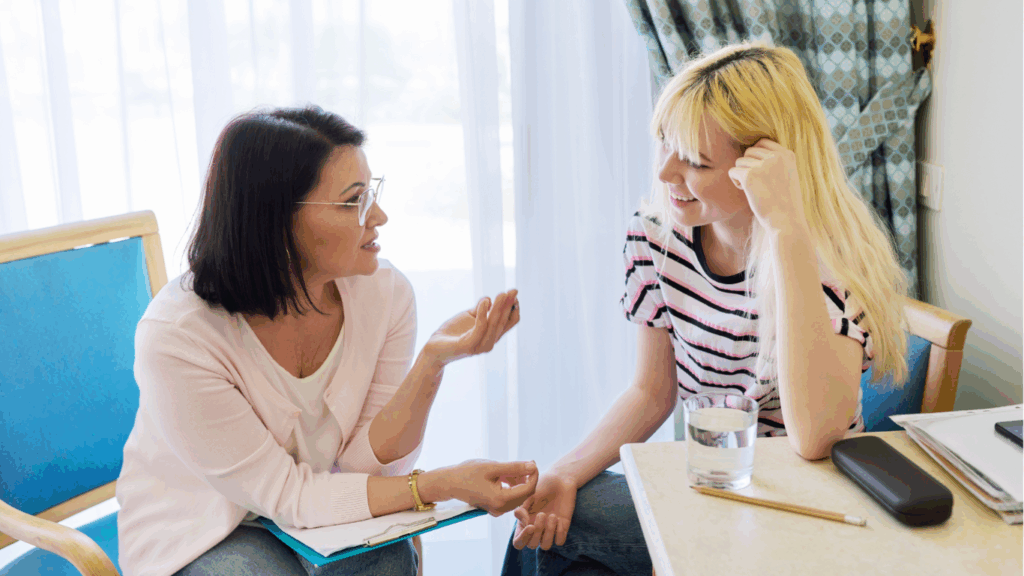Like new biological parents, some adoptive parents can become blue or even experience some depression once a baby or child comes home. This can occur for several reasons. It’s nothing to be ashamed about, but you do need to recognize it and get some help.
I remember walking down the streets of East Vancouver pushing my newborn baby’s stroller and sobbing. I was exhausted from lack of sleep, trying to care for a baby—something I knew precious little about—and from loneliness. I felt that I had thrown away my season ticket to freedom, and I longed to go back to my previous life.
My husband was not much happier. The transition to parenthood was just as hard for him, except he was able to go to work everyday and escape the domestic mayhem. We were both too tired and dazed to do a good job of supporting each other. We needed more than each could provide.
I recall crying down the phone to my sister thousands of miles away. She, as ever, was practical. “Did you meet anyone half decent at your prenatal classes, and do you have their phone numbers?” she asked. When I said that I did she said, “I’m calling you back in three days. By then I want you to have arranged a picnic or something with them.”
I took her advice. We had that picnic and six years later I am still friends with most of those other mothers. I was relieved to discover that most of them were finding adjusting to parenthood equally challenging. Of course that didn’t eliminate my problems; it took me several more months to adjust to and to start to enjoy being a mother, but it was a turning point. Despite those problems, I never stopped loving my child—finding parenthood difficult is not a sign that you have failed, that you are going crazy or that you don’t love your child.
Post-adoption depression
While most of us have heard of postpartum depression, post-adoption depression is much less understood or acknowledged. Just as new biological moms can slide from the initial euphoria of becoming a mom into depression once the reality of being a parent sinks in, so can adoptive parents.
The Vancouver based Pacific Post Partum Support Society estimates that between 10-28% of new mothers experience postpartum depression to some degree, and that most new mothers have at least experienced a few days of the “baby blues”. Reliable figures on post-adoption depression are hard to come by, but anecdotal evidence and small scale surveys indicated that aroudn half of new adoptive parents experience some sort of problem ranging from baby blues to actual depression.
Admitting to postpartum or post-adoption depression can be hard for most parents—for adoptive parents it can be even harder. After all the decision making, struggles with the adoption process, and in many cases great expense, it can be difficult to admit to finding it hard to cope or being anything other than delighted. Some parents I have spoken to tell me that when they have confessed to feeling blue others will say something like, “Well you wanted the child—it’s all you’ve talked about for two years!” or, “Don’t be silly, you didn’t have to go through a pregnancy or birth.”
Some adoptive parents are fearful of admitting to difficulties because they feel that this may jeopardize a future adoption. Your agency and social workers should be familiar with postpartum or post-adoption depression and are unlikely to or should not judge you for experiencing such a common problem.
Instant love
It doesn’t help that numerous articles quote new adoptive parents as saying something like, “I loved my child before I even met him!” or “The moment she was place in my arms, I fell in love with her.” While that is wonderful for those parents, instant love is not always the case, especially if the child is not a newborn. Not experiencing this sort of response to a new child can be a source of disappointment and guilt.
Contributory factors
We are not meant to parent in isolation, yet in North America that is exactly what most new mothers, and in some cases fathers, have to do. In cultures where there is a strong extended family, the incidence of postpartum depression or adjustment is far lower.
If we examine the causes of postpartum depression (an umbrella term which covers different degrees of depression or anxiety), the majority of them can just as easily affect an adoptive parent. Though not “official,” the term postadoption depression has been coined to name this problem.
In some cases there may be a combination of causal factors. These include hormonal changes, sleep deprivation, unresolved issues from the past resurfacing (i.e., infertility issues), lack of a support network, change of or lack of structure in the day, separation from work, a difficult baby, marital tension, financial worries, a feeling of loss of identity or self-esteem, loss of freedom, lower energy levels, high anxiety, or being a perfectionist in a situation where perfectionism is hard, if not impossible, to attain.
There may be other triggers to feeling blue or depressed. In an article in Today’s Parent, an adoptive mother who could not reconcile the birth mother’s feelings of loss and grief with her own sense of satisfaction is mentioned. Dealing with other people’s attitudes or insensitive comments toward adoption can also be far more difficult than expected and contribute to feelings of isolation.
Most adoptive parents do not have the luxury of a nine-month preparation period for parenthood. During pregnancy the body slows down, and there is time to at least try to prepare mentally. Towards the end of the pregnancy a women may get up several times a night to go to the bathroom. This has the added function of getting her used to disturbed sleep. Adoptive parents are so involved in the actual process of adoption that they are deprived of this slowing-down process. Protecting oneself against the disappointment of a placement falling through can also prevent prospective adoptive parents from being able to properly prepare for the new arrival. Instead, new adoptive parents often take the full force of new parenthood all in one go.
Solutions
The good news is that you will get better. Some women recover after a few weeks, for others it may take months. Your recovery will, of course, depend on the number of factors which are causing you to feel low, anxious or depressed, and how easily you are able to find solutions. You will feel better far more quickly if you seek help.
Try to break down and evaluate all the factors that may be causing your unhappiness. Find solutions to ones that are easy to solve—if you have people around that can help, ask them to babysit, do some shopping for you, cook for you, watch your child while you sleep or just come and keep you company. If you are unable to do this, or it doesn’t help, visit your doctor and or local health unit—if your symptoms are especially severe prescribed medication may be needed; or you may be referred for counselling or other supports.
Never underestimate the value of other parents—particularly adoptive parents. Join a local parent group—call Belonging Network for a support group or buddy parent in your area. Visit the local recreation centres and sign up for activities that will give you a change of scene and put you in contact with other parents.
Call the Pacific Post Partum Support Society. They understand that adoptive parents can face the same difficulties in the early stages of being a new parent as biological parents. The Society runs support groups throughout the Lower Mainland, provides information and support for partners and family members of women experiencing postpartum or post-adoption depression, and have information packages and a self-help guide available.
If you don’t live in the Lower Mainland, they can put you in touch with resources in your area. While their support groups are for families with children under three, they will provide telephone advice and support to parents and relatives with older children.
If you are reading this article before you adopt a child, don’t despair, chances are that though you will definitely have to make some adjustments, and you may find it hard, you may not experience anything other than all the all the joy you hoped for.
The Pacific Post Partum Support Society welcomes all new parents, biological and adoptive, male and female. They can be reached at 604-255-7999, toll free at 1-855-255-7999, or postpartum.org.





